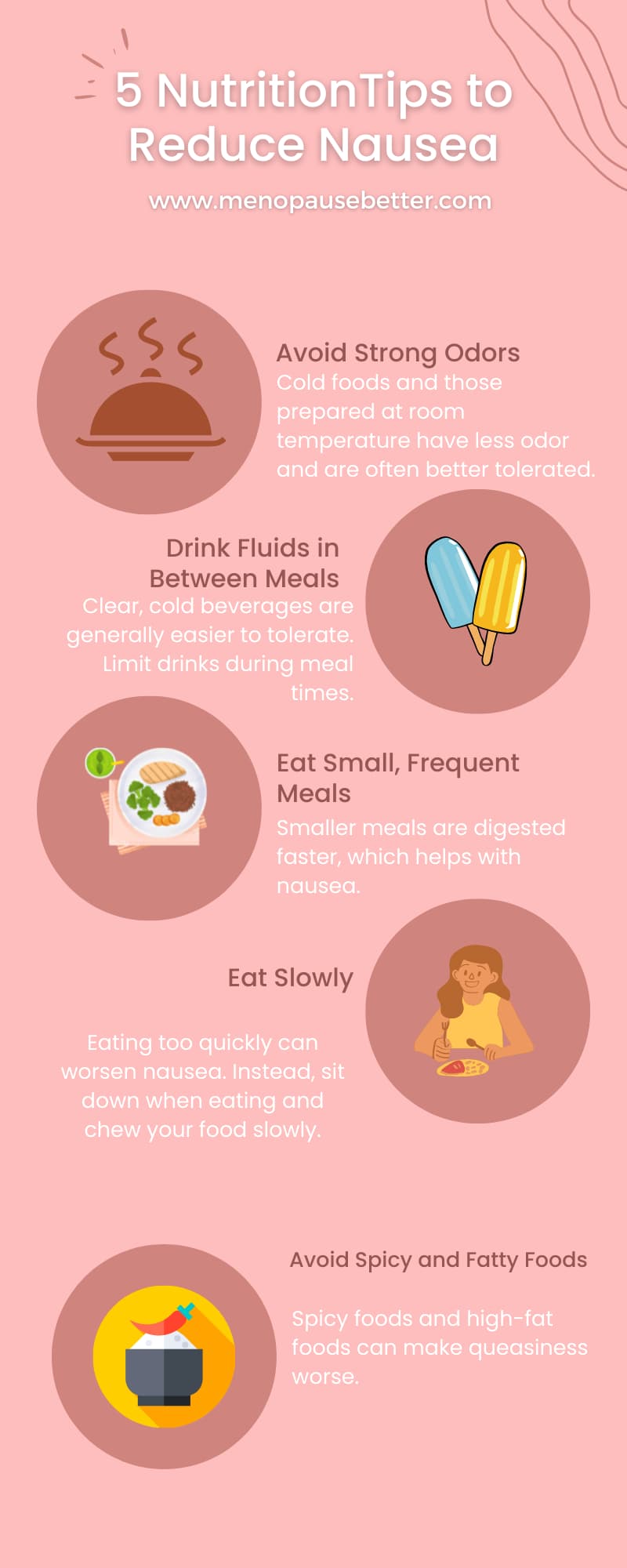Does Menopause Cause Nausea? [+ Remedies]
It might be surprising, but it’s true that nausea can be a symptom of menopause. It’s a relatively uncommon symptom that could be caused by changing sex hormones or other menopause symptoms.
Table of Contents
ToggleThis article will discuss the causes of nausea during menopause and the various treatment options available.
What Causes Nausea During Menopause?
There are several possible causes of nausea during menopause.
Hormonal Changes
The way that the hormones estrogen and progesterone fluctuate during menopause can cause a range of different symptoms, including nausea and vomiting.
Hot Flashes
Hot flashes can sometimes cause nausea.
In a study published in the Journal of The North American Menopause Society, 5% of the participants reported feeling nauseous during a hot flash.
It’s possible that nausea can be caused by the release of hormones during a hot flash. This sudden emission of hormones is a stress response and is particularly common during severe hot flashes.
Anxiety
Anxiety is a common menopause symptom. It shares a bidirectional relationship with nausea, meaning anxiety can cause you to feel sick and vice versa.
It’s believed that when you’re anxious, neurotransmitters are released, which can lead to an upset stomach and queasiness.
Stress
Acute, intense stress can cause nausea. Stressful life events, such as the death of a loved one, divorce, or job loss, can all trigger this symptom.
More long-term chronic stress can also lead to this symptom. Women in menopause are dealing with physical, psychological, and social changes that can be very stressful. Because menopause can be such a difficult time for many women, it can trigger or worsen existing stress disorders.
GI Disorders
Menopause can worsen existing digestive disorders or trigger new ones, creating the ideal conditions for nausea.
Talk to your doctor if you suspect that menopause is making your GI issue worse or you’re experiencing new digestive symptoms.
Unfortunately, each one of these problems takes a different – and sometimes surprising! – approach. After seeing your physician, a registered dietitian can help to figure out an eating plan that will work well for you.
For an in-depth look at the connection between menopause and stomach issues, read our blog post.
Hormone Replacement Therapy (HRT)
Hormone therapy, also known as menopause replacement therapy (MHT), effectively treats menopause symptoms.
Similar to many other medications, possible side effects include nausea, anxiety, depression, and increased appetite. However, it’s a very effective treatment for your menopause and perimenopause symptoms. Therefore, if you experience nausea while on HRT, it’s best to speak to your physician to find a way to resolve the issue.
Other Causes
Nausea is a symptom. Therefore, in order to avoid it, it’s important to find the root cause.
If it’s not related to any of the conditions listed above, feeling sick for a day or two might be due to an infection, food poisoning, exposure to toxins, indigestion, or viruses. But sometimes, nausea can be more persistent.
Menopause Nausea Relief
The most important aspect of nausea treatment is identifying and resolving the underlying cause. However, you can still do many things to get relief.
Avoid Strong Odors
Strong smells can trigger or worsen nausea. Cold foods and those prepared at room temperature have less odor and are often better tolerated when you’re feeling sick to your stomach.
If cooking causes you to feel queasy, ask a friend or family to cook for you. You could also try cooking on the days you feel better and freezing meals for later use.
Drink Fluids
Dehydration can make nausea worse. Try to drink plenty of fluid throughout the day, even if you don’t feel thirsty. Sip slowly and avoid carbonated or caffeinated beverages. This is especially important if vomiting is another of your symptoms.
Clear, cold beverages are generally easier to tolerate when you don’t feel well. Recommended beverages include popsicles and ice cubes.
Eat Small, Frequent Meals
Smaller meals are digested faster, which helps with nausea and other stomach issues.
Foods that can help with nausea include dry, starchy, or salty foods such as pretzels, saltines, or white bread.
Avoid Eating Fried Foods
High-fat food can take a longer time to digest and worsen your symptoms.
Avoid Spicy Foods
Spicy foods can make queasiness worse. If you enjoy spicy foods, start with a small amount and gradually increase the spice level to find what works for you.
Limit or Avoid Caffeine
Coffee is a diuretic and promotes the removal of water from the blood. Because it causes water to be drawn from the blood into the digestive system, it can also worsen this symptom.
Eat Slowly
Eating too quickly can worsen nausea. Instead, sit down when eating and chew your food slowly to help with digestion.
Avoid Drinking Liquids During Meals
Avoiding liquids during mealtime can help control feelings of nausea during mealtimes. Instead, drink 30 to 60 minutes before and after eating.
Manage Stress and Anxiety
Stress and anxiety can trigger nausea or make it worse. Try to manage stress with relaxation techniques such as meditation, yoga, or deep breathing exercises.
Get Plenty of Rest
Fatigue can also increase feelings of nausea. Try to get at least eight hours of sleep each night. If you have problems sleeping, speak to your physician about treatment options.

When to See the Doctor
If nausea lasts for more than a few days, is severe, or prevents you from eating and drinking, it’s best to see your healthcare provider.
Furthermore, if you feel queasy and have other symptoms such as fever, abdominal pain, or headache, then it’s advisable to seek medical help.
The Bottom Line
Nausea is a possible symptom of menopause that can be caused by hormone fluctuations, other menopause symptoms such as hot flushes and digestive problems, or side effects of medications or treatments.
Dealing with the root cause of nausea is key to controlling it. You can make many lifestyle changes to reduce the feelings of queasiness that can affect your quality of life.

Dr. Su-Nui Escobar, a Registered Dietitian/Nutritionist in Miami, FL, is dedicated to empowering women in perimenopause and menopause to live healthier, more satisfying lives.
With a doctorate in clinical nutrition from the University of North Florida, she has expertise in menopause and weight loss, including the unique challenges faced by those on weight loss medications.
Su-Nui’s passion for her field is evident in her previous role as the Academy of Nutrition and Dietetics spokesperson.


